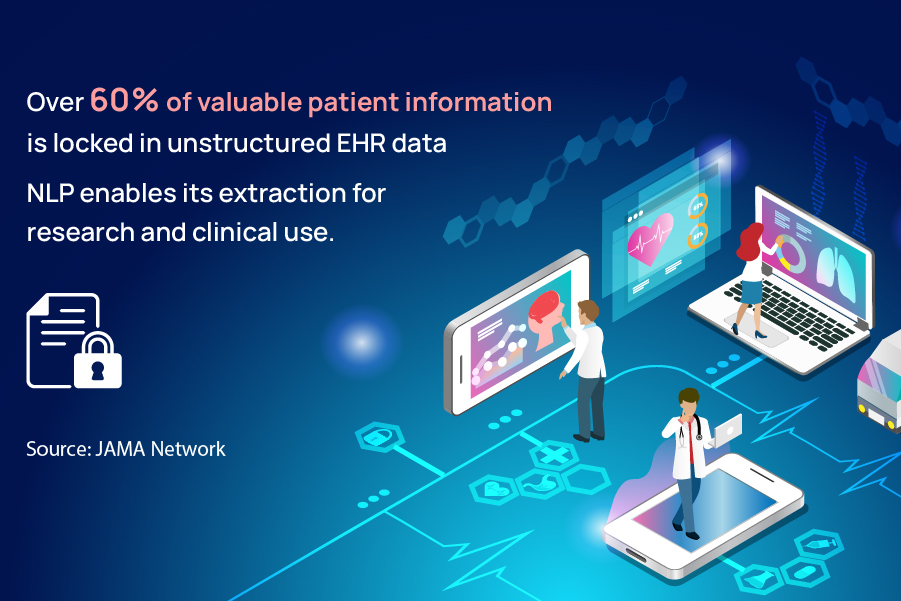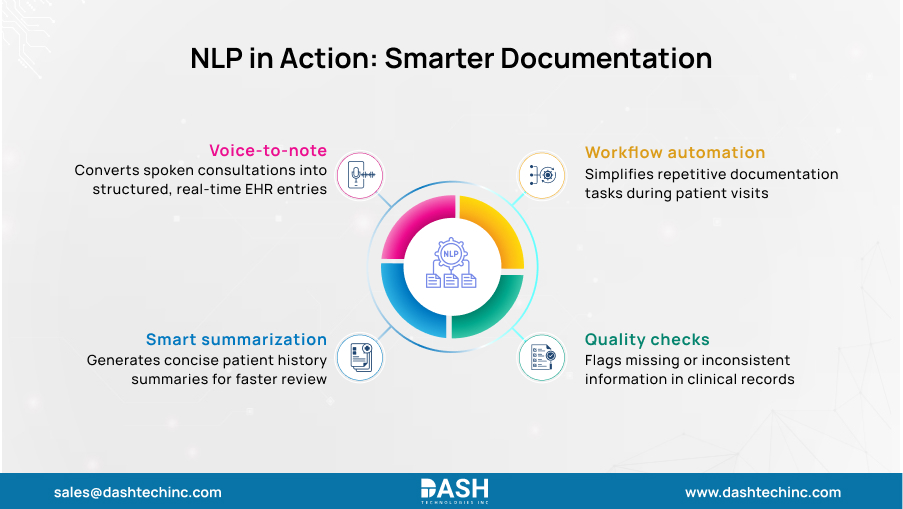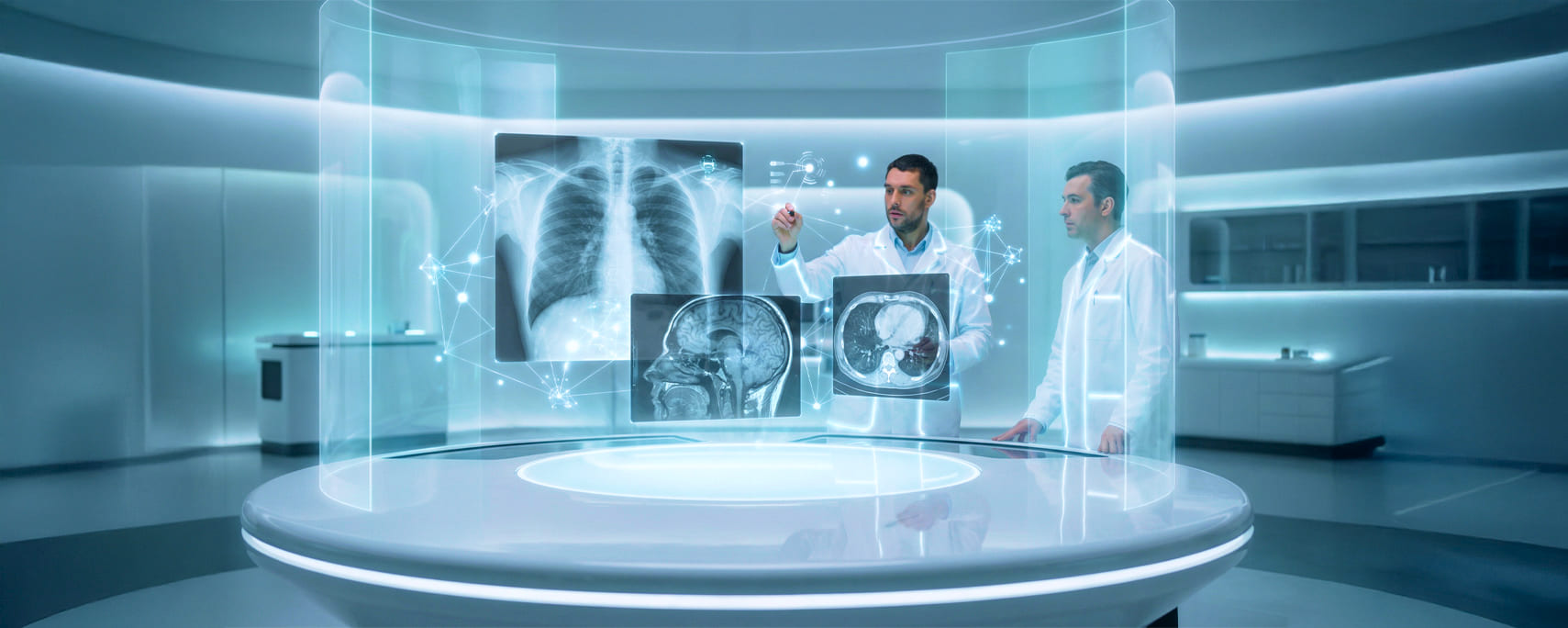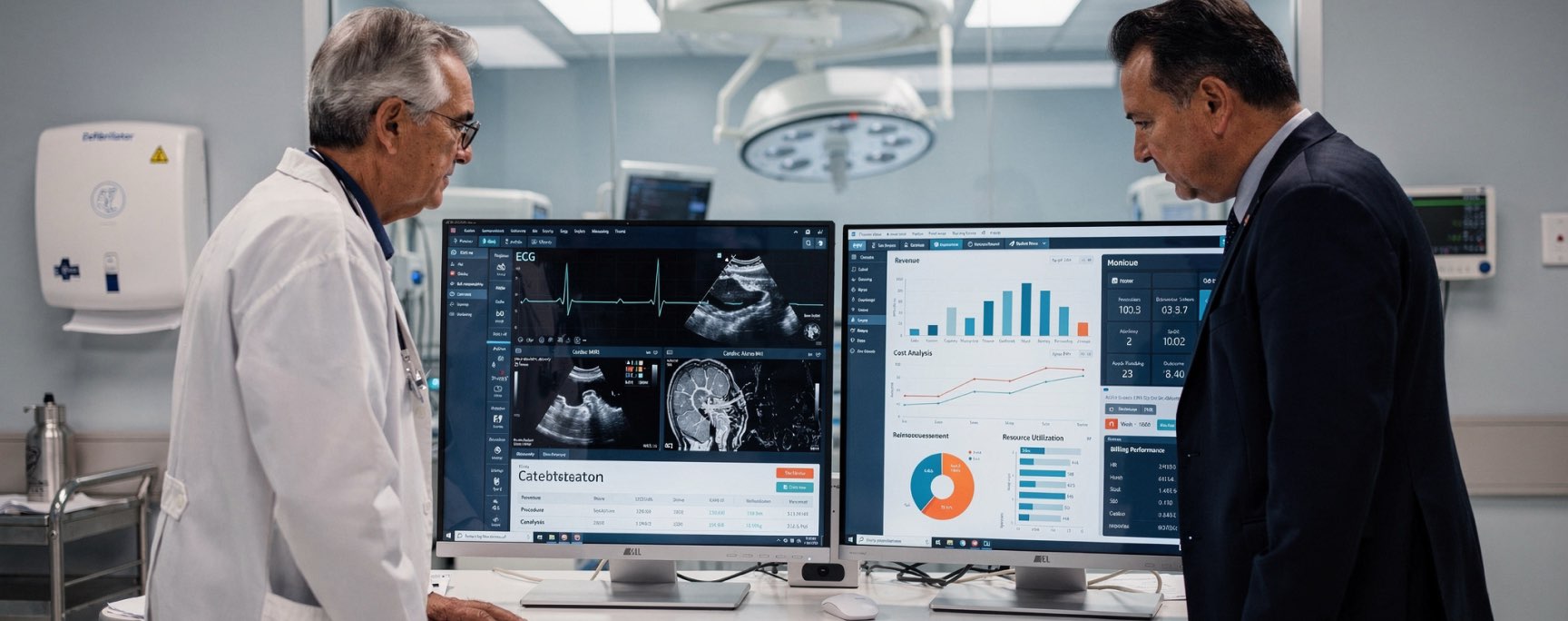How NLP is Catalyzing Medical Records with AI-Powered EHR Systems
Electronic Health Record (EHR) systems were initially conceived as the digital backbone of modern healthcare, but now it is AI-powered EHR systems. They were envisioned to introduce streamlined processes, whole patient records, and solid evidence for evidence-based medicine. But for many healthcare executives and providers who directly engage with patients, the experience has too often been one of disillusionment. Instead of being a seamless instrument, the EHR has too often been a primary source of operational resistance, fiscal burden, and professional exhaustion.
The core of the problem lies in a single, staggering statistic: up to 80% of the most valuable clinical information is trapped in unstructured formats. This includes the rich, narrative details found in physicians’ notes, discharge summaries, lab reports, and patient communications. This data is “dark,” unreadable to traditional software and analytics platforms, leaving a wealth of insight buried in free text.
A healthcare system bogged down by inefficient, insight-poor EHRs is fundamentally incapable of executing this strategic transformation. Solving the unstructured data problem isn’t just about fixing the EHR; it’s about heading into the future of healthcare.
What is Natural Language Processing in Healthcare?
Natural Language Processing (NLP) is a subfield of Artificial Intelligence (AI) that allows computers to understand, interpret, and generate human language, in both text and speech. NLP serves as a mediator between humans’ contextual communication and the structured, binary world of computer analysis.
In healthcare, Electronic Health Records (EHR) systems store critical patient information, but much of it is unstructured text, such as doctors’ notes or discharge summaries. The main function of NLP for EHR systems is to read unstructured clinical text and automatically transform it into structured, analyzable information. These extracts “buried” data from its sources, makes it accessible to software for the first time, and opens it up to automated workflows, advanced analytics, and true clinical intelligence.
Ready to Power Up Your EHR System?
Harness the potential of AI and NLP to enhance clinical workflows, data accuracy, and patient outcomes with our custom EHR solutions.
Contact Us to Get StartedHow NLP Improves Electronic Health Records
Accelerating Clinical Research and Insights
NLP integrated EHRs are solving this problem as they are more cost-effective, scalable and faster methodology to speed up the process of clinical research. By transforming unstructured clinical notes into practical data and insights, NLP accelerates patient identification for trials, real-world data analysis and outcome measuring — without the trouble of not manually shifting around gigantic piles of useless info.
As a matter of fact, more than 60% of useful patient information exists in unstructured clinical notes which make it impossible to leverage those for research or clinical decision making without adoption of NLP.
Key benefits include:
- Cohort Identification: Locates patients who meet study specific inclusion/exclusion criteria within minutes of unlocking the data.
- Real-World Evidence Collection: Utilizes knowledge from routine clinical activities to confirm the therapeutic efficacy and safety
- Longitudinal Data Analysis: This group of options focuses on tracking patient progression over time by assessing narrative notes, structured fields or both together.
- Faster Hypothesis Generation: Identifies patterns and correlations in clinical data to support research hypotheses

Enhanced Clinical Decision Support
NLP capability of EHR software is leveraged by AI-powered EHR systems to provide real-time, evidence-based suggestions during consultation with patients. These smart EHR solutions using NLP analyze patient history, present symptoms, and medical literature to suggest the best course of treatment and identify potential risks.
Key decision support functions include:
- Risk Stratification: Recognition of high-risk patients through full data analysis
- Drug Interaction Alerts: Real-time monitoring for drug conflicts
- Clinical Guideline Integration: Aligning treatments with the latest best practices
- Predictive Analytics: Patient outcome & possible complication forecasting
Improving Patient Data Accuracy
One of the biggest benefits in using NLP with EHRs is that surgical precision accuracy can be achieved ultimately which in turns translates to ever-growing quality (360 bidding), and data volume-based healthcare through NLP. The manual entry of data in healthcare can introduce human error, variability in terms used, and also incomplete information or items that are missed altogether.
NLP addresses these issues by:
- Standardized Terminology: Automating the process of linking and mapping clinical terms to vocabularies like SNOMED CT and ICD-10 synonymously captures the term and ensures uniformity of representation of data across providers and enterprise systems.
- Error Detection and Correction: Improving clinical documents with AI and NLP functionalities that highlight imbalances and gaps in the clinical notes within the electronic health record systems optimally ward before impacting patient care.
- Extensive Data Capture: Often overlooked are the social determinants of health, family history, and lifestyle factors which are crucial to patient care but housing and documenting, are frequently omitted and overlooked chronicling during manual reviews.
- Contextual Understanding: Medical terms, abbreviations, and intricate vocabularies are often misinterpreted but with advanced NLP, a more accurate understanding of a given context eliminates these challenges.
Build AI-Powered EHR Solutions with Us
From smart documentation to predictive analytics, we build intelligent, scalable EHR systems tailored to your organization’s needs.
Talk to Our ExpertsEnhancing Interoperability and Data Integration
Through the enhancement of AI and NLP on EHRs, system interoperability is greatly facilitated, enabling full data exchange with other healthcare systems and providers. AI NLP EHR systems employ the standardization of data which mitigates fragmentation and provides consolidated patient profiles, leading to more comprehensive care.
Core elements of this integration include:
- Data Harmonization: The integration of siloed disparate records from multiple healthcare systems into one unified and queryable database.
- Cross-System Communication: Elimination of delays for the exchange of data across healthcare systems.
- Security and Compliance Features: Ensuring HIPAA compliance when processing and transferring confidential data.
- Scalability for Large Datasets: Efficient handling of large data for improving population health management.
Streamlining Documentation with NLP

Natural language processing plays a crucial role in improving EHRs by enhancing clinical documentation. Systems that autonomously capture and organize interactions between healthcare professionals and patients reduce administrative duties, enabling clinicians to focus more on patient care.
Features in this aspect include:
- Voice Recognition Integration: During interactive consultations, a patient’s symptoms and relevant discussions about their treatment can be captured and converted into structured notes at the same time.
- Automated Summarization: Prior relevant patient engagement, including relevant histories of issued diagnosis(s), procedures performed, and medication prescribed, can be succinctly captured with patient histories for easy retrieval.
- Workflow Automation: This includes capturing updates during consultations like noting silences as pauses or updating and integrating within the EHR automatically document updates make capturing notes easier.
- Quality Assurance: It can be embedded that checks for completeness within the documented evidence. For instance, a provider documenting “I have contents a,b,d and e.” and “I have a,b,c,b? and d.” in another note, NLP can detect these discrepancies and flag them as well— exposing inconsistencies.
Challenges and Solutions in Implementing NLP for EHR Systems
While NLP holds promise, it’s not without challenges. NLP handles a large amount of data; therefore, data privacy is a primary concern. Regulations such as HIPAA call for strong security, and breaches could erode trust. Solutions range from sophisticated encryption to learning AI models on anonymized data to reduce exposure.
Interoperability, or ensuring NLP tools function across various EHR systems, is another hurdle. Many healthcare IT systems are still siloed, but emerging interoperability standards and AI-driven data integration efforts are making progress. For instance, research into autonomous database reconfiguration for “Elastic EHR” models has enabled the identification of optimal configurations without manual intervention.
Training and adoption can be problematic. Clinicians may resist new tools if they are not intuitive or time-consuming to use. This is overcome by intuitive interfaces and extensive training, as with highly rated usability products. Cost is the secondary driver, but the long-term ROIs via error reduction and efficiency gains will typically pay for themselves.
Final Thoughts
The timeline for widespread adoption of EHR software is accelerated by AI. The timeline is not speculative, it’s forecasted. Forward-thinking healthcare institutions that are the first to inappropriately miss the adoption accelerated agenda not to mention smarter integrated systems will leap forward with advancing emeries. The smart systems will seamlessly augment teams to provide the highest level of patient engagement.
The shift to a smart EHR requires a partner with established experience in AI-powered EHR Systems and the complexities of the healthcare environment. Dash Technologies has experience in building and integrating custom healthcare AI for EHRs, keeping your solution powerful, compliant, and smoothly integrated with your clinical workflows.
Contact Dash Technologies today to explore how we can help you achieve the true potential of your EHR data.
About Dash

Dash Technologies Inc.
We’re technology experts with a passion for bringing concepts to life. By leveraging a unique, consultative process and an agile development approach, we translate business challenges into technology solutions Get in touch.







